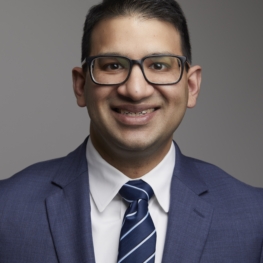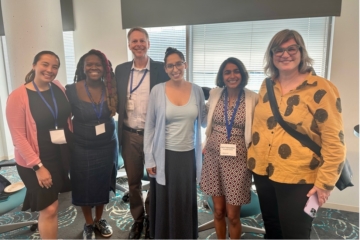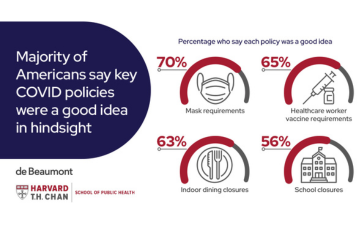Blending his expertise in public health and medicine, Sameer Vohra MD, JD, MA, brings a unique perspective to his role as the director of the Illinois Department of Public Health. Championing mental health parity, especially among children, is one way that his background as a pediatrician now influences his approach to population health challenges.

Photo courtesy of Sameer Vohra
Vohra spoke to the de Beaumont Foundation about making the shift from clinical care to public health, where his experiences overlap in serving as Illinois’ leading health official, and how his fellow 40 Under 40 cohort members inspire and motivate him.
You have a range of work and educational experiences. How did you decide to focus on public health?
It was always a desire for me to connect and understand the pieces that made somebody healthy. That is at the core of what we’re trying to do in public health every day: thinking about how our communities function, how our systems work together, and how that affects overall health. For me, part of that pathway was to think about it through the lens of medicine, a place where I think many of us initially connect to health. But as I went through my own schooling and understood how critical law and policy were to how our governmental systems function, I knew that I couldn’t get to my ultimate goal in a career that has an impact without thinking about it from a larger public health lens, and not only through that clinical health care delivery lens.
How do you connect being a pediatrician by training to your public health values and skills?
The core principles of public health are built into most pediatricians, especially primary care pediatricians, because a lot of your job is trying to prevent disease in young children and promote the right behaviors for them to lead the healthiest lives. Although as pediatricians, we treat severe illnesses, a majority of our job as primary care pediatricians is wellness visits, making sure that you understand people’s lifestyles and the barriers for them to get healthy. Things that we promote in public health all the time like vaccinations are key to every well-child visit.
For some of the biggest challenges my patients were facing, I didn’t have solutions in my clinic. Much of it involves these social and structural systems-based issues that need to be thought about on a government policy level. It really steered me towards a career that combined trying to think about the health care delivery system and making sure it connected to our public health system.
You are especially passionate about children’s mental health. Why is this so important to you and why should we be talking about it?
Children are faced with a lot of challenges, especially those in our most vulnerable communities. They are dealing with everyday challenges around poverty, education, and safety. Then we had a pandemic where kids faced deep social isolation being removed from school environments. This created a really big children’s mental health crisis. We need more childhood psychiatrists and psychologists. But my goal is answering how we prevent the kinds of traumas that can lead to the lifelong challenges we see in children and ultimately in adults. To create a core public health system, that prioritizes prevention and promotion of better practices, we have to think about our mental health just as much if not more than our physical health.
What led you from a school of medicine to governmental public health? What has that transition been like?
It’s been exciting, exhilarating, complicated, challenging, and part of the unique but exciting opportunity that is work in government. I absolutely loved my old job as founding chair of a department of population science and policy at Southern Illinois University School of Medicine. There, we could be an innovation engine that was trying to combine research with community engagement and applying those perspectives to policy-level solutions. But in that space, I was only an advisor to government action, not a decision maker.
One thought beginning a job like this is how can you connect government, especially now, to build the kinds of modern, resilient systems that we know we need to improve health? Government also needs to be built to be responsive to people’s everyday, immediate needs. That is a huge challenge in government, because government often works in cycles. I know having this great honor of being the public health director in Illinois and the state’s top doctor is a time-limited role. Trying to make the most impact and make it sustainable is something that we can all grow and get better at, and is one of my big goals in this role.
What have you enjoyed most about being part of the 40 Under 40 in Public Health?
In all the ways we think about public health — whether in state and local government, on the federal level, within universities, or running programs — it is really hard work. And often, people in the general public don’t really understand what we do. That’s one of our other great challenges: being able to effectively communicate what it means to be a public health professional.
Since that alone is so hard, it has been critical for me to have a group like the 40 Under 40 in Public Health that knows and understands our public health challenges, knows what it means when you go through these different public health roles, and serve as confidants during tough times. My 40 under 40 colleagues are an incredible group of individuals that I have at my disposal that make me a better person and professional. It’s been very helpful for me in transitioning to this new role.
Even a couple of days together creates important connections and budding friendships that will be important relationships throughout my professional career and beyond.
What five words would you use to describe your experience in 40 Under 40?
Connection, support, innovation, creativity, and friendship. It’s the group of people that you believe together can really change and impact the world around public health.
What’s your advice for people who want to be part of the 40 Under 40 program?
It takes a lot of courage to think that you’re good enough for this program. If interested, I encourage you to nominate yourself or seek others to nominate you. And the beauty of de Beaumont is they’re looking very holistically about who meets the criteria for this honor, and it could very well be you.
How should future honorees approach the program?
What you find immediately is that the cohort has so much to offer. But you as a future honoree also have so much to offer the cohort. Use this time together to learn from each other, make meaningful connections, and be better servants for public health.
Ready to nominate yourself or another outstanding public health professional? Nominations are open through May 17.




